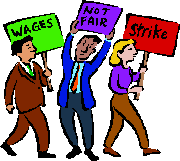Author: John WojcikThe labor movement remains undaunted in its push for the Employee Free Choice Act despite the defection of Pennsylvania’s Arlen Specter, the only Republican member of the Senate who had supported the measure. Specter announced March 24 that he will now oppose the legislation.
Stewart Acuff, special assistant to AFL-CIO President John Sweeney, described the defection as a result of “corporate America’s increasingly desperate efforts to maintain their destructive stranglehold on our economy and on our lives. They have lied over and over ad nauseam about the Employee Free Choice Act and they have tried to bully U.S. Senators just as they do workers who try to form unions. They are spending hundreds of millions of dollars to obfuscate, distract, and confuse the public and lawmakers.”
The right wing drive has reached into the Republican primary elections in Pennsylvania where the latest Quinnipiac University poll shows that Specter may have difficulty keeping his seat in 2010. He’s trailing former Congressman Pat Toomey 41 to 27 percent in the Republican primary.
Sources in the labor movement say that union leaders had met with the senator to assure him that, had he remained a supporter of employee free choice, labor would have worked to get union members to cross over from the Democratic Party to vote for him in the Republican primary.
Union leaders believe that, despite the setback with the loss of Specter, who was a cosponsor of the Employee Free Choice Act two years ago, labor has what it takes to win passage of the measure.
“What grassroots American movement can, in the span of one week, run 57 letters to the editor in newspapers across America, send 14,000 handwritten letters to 10 U.S. senators, and simultaneously plan 35 grassroots advocacy events with workers in 10 states? America’s labor movement can,” Acuff said.
AFL-CIO President John Sweeney said that while Specter’s cave-in to corporate lobbyists is disappointing, it won’t blunt the momentum behind the fight to protect the right of workers to form unions and bargain for a better life.
“The fact is the Employee Free Choice Act has more support than ever,” Sweeney said, “with large majorities in both houses of Congress, the president and vice president, and 73 percent of the public. We do not plan to let a hardball campaign from big business derail the Employee Free Choice Act or the dreams of workers."
Specter’s main excuse for backing down was that “it is not best to consider measures that would increase unionization during a recession.” The labor movement’s position is that, historically, the nation’s most important labor law reforms have been made during tough economic times. The National Labor Relations Act, which made encouragement of collective bargaining rights the official policy of the government, was enacted during the Great Depression. Labor’s position is that the higher wages and better benefits that would result from greater union density would provide the economy with the boost that it needs.
There is evidence that this point of view is taking hold well beyond the ranks of the labor movement.
The Wall Street Journal admitted on its editorial page recently that the Employee Free Choice Act would not destroy secret ballot elections.
The Economic Policy Institute recently released a study by John DiNardo, professor of Economics and Policy at the University of Michigan, that says unions do not harm businesses and do not destroy jobs.
CNBC’s strongly pro-business host, Erin Burnett, said on Meet the Press, recently, that the “populist rage” sweeping America results from 30 years of stagnant and declining wages, anger over CEOs making 400 times what the average worker earns, and from a recession created, at least in part, by a lack of demand and buying power.”
Growing support for the Employee Free Choice Act has forced even sections of big business to put forward what they describe as “compromise measures.” Starbucks, Costco and Whole Foods have endorsed their own version of labor law reform which leaves in place the company-dominated elections and includes no requirements for companies to negotiate once a union is formed.
“Though their so called compromise is totally inadequate,” Acuff said, “it does signal that the ranks of corporate America have broken down as the passage of employee free choice becomes more inevitable. “It is a rare, beautiful thing when we see the class solidarity of the upper classes break down. Sometimes it mistakenly seems that the class solidarity of the upper classes is the most powerful thing in our political economy. Of course, it isn’t as we learned in November of 2008 and are learning again today.”
Note:In his statement Specter also cited his concern that passage of the Act would eliminate the secret ballot elections. Would somebody please send him a copy of the Wall Street Journal editorial - B.A.

